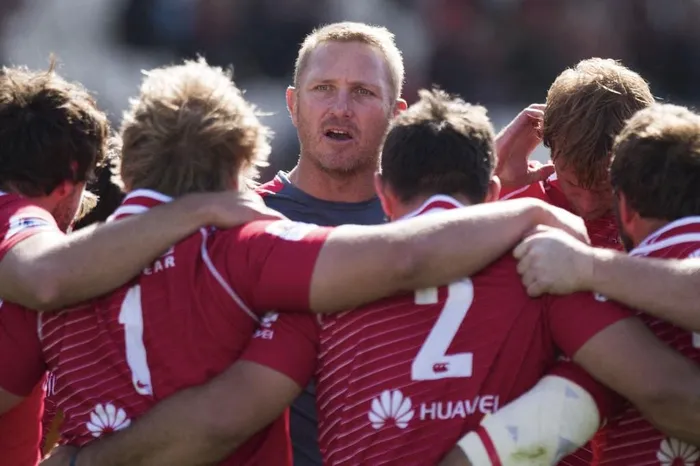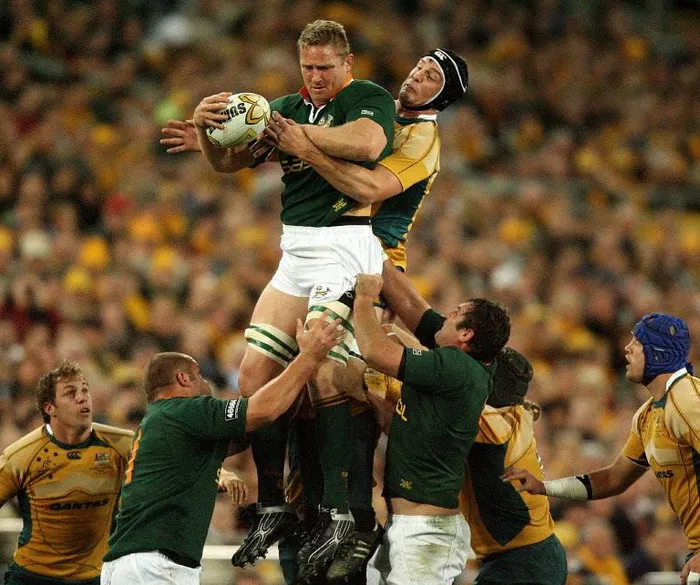The Springbok who kept coming back — the making of new Bulls coach Johan Ackermann
South African Rugby

Johan Ackermann was named new Bulls coach this past week. Photo: Backpagepix
Image: Backpagepix
In 2001, the Cats rugby team was on a Super 12 tour in Australia. On the rowdy bus trip to a training session, something was said that annoyed Johan Ackermann.
When the bus broke out in laughter at the offending remark, Ackermann quietly got up and walked to the front of the bus, took the microphone, and sternly said in Afrikaans: “Make a queue. I don’t want to go looking for anyone.”
No one moved and the journey continued in reverent silence. That encapsulates the presence commanded by a giant who was mostly gentle, but not always ...
And that reminds me of a Sharks training session I watched in 2005. The forwards were embroiled in a robust mauling session.
Suddenly, there was a mighty bellow and from the centre of the maul, players were flung in all directions, like toothpicks, until there was just Johan Ackermann, the epitome of the Incredible Hulk. Except his face was red, not green.
Somebody (surely mistakenly) had grabbed the big man in the nether region, and the response was volcanic.
Ackermann was from the old school, a throwback to the amateur era of Springbok invincibility when rugby was a peace-time form of warfare, a theatre in which men aspired to the virtues of courage, loyalty and brotherhood.

Johan Ackermann during his playing days for the Springboks. Ackermann played 13 Test for SA. Photo: Backpagepix
Image: Backpagepix
Men like Ackermann, who was an anachronism in the modern era, where many are pampered prima donnas.
Consider that this guy’s career spanned an incredible two decades – his final match, for the Sharks against the Bulls at Loftus Versfeld in 2008, was 20 years after he had made his debut on the same ground for Northern Transvaal Under-20.
He had shoulder surgery four times, knee surgery twice, a serious neck problem, and a two-year suspension for use of a banned substance. He had careers with the Bulls, Lions, Cats, Sharks and Griquas, and played club rugby in Italy and England. He had three separate Springbok careers, with five-year exiles in between each stint.
He was the oldest man to play for the Springboks (37) until overtaken by Victor Matfield and Schalk Brits (both 38). After finishing at the Sharks, for good measure, he played two seasons of club rugby for Cape Town club Hamiltons.
Like that Old Man River in the famous song about the Mississippi, Ackermann kept rolling on, occasionally tumbling down waterfalls, recovering to shoot the rapids.
So Ackermann’s career went full circle — he tapered off at club rugby, which was where he started with Pretoria Police after finishing school in Benoni in 1987.
“And what days they were,” he told me in 2009. “We used to eat steak and chips on a Friday night before a game, washed down with beer. Now it is Powerade and pasta!
“I had no rugby pedigree when I started but found myself in a Police team that was packed with Bulls,” he recalled. “There was tremendous camaraderie, and that is why I chose to finish at club level, so that my family could experience the fun of a Saturday afternoon at the club, with the kids kicking a ball around and the braai afterwards.
“I wish more youngsters would continue with rugby after school so that they can experience the social side of rugby.”
Ackermann’s early days in Pretoria’s unforgiving Carlton Cup moulded him into a no-quarter-given type of lock.
“Half the armed forces were stationed in Pretoria at that time and club rugby was bloody fierce,” he recalled. “You had to dish it out and you had to take it. If the opposition wavered, you had them. That was how we won the games against the students — we won the fights,” he laughed.
But this Sherman tank ploughing through the opposition is at odds with the silent giant off the field.
“When I put on the jersey, it is like putting on armour for battle,” he explained. “Afterwards, I take the armour off and shake hands. But for the 80 minutes, the opposition is the enemy and they must lose. Simple!
“Playing rugby is more than sport,” he continued. “It is about loyalty to your mates and the spectators. Can you look in the mirror if you have not given your all?”
It was on August 3, 1996, that Ackermann’s life changed. It was the Springboks versus the Wallabies in Bloemfontein in a Tri-Nations match.
Ackermann was playing in his fourth Test. At 26, he had the rugby world before him until he was stretchered off with a knee injury.
“I had an operation and the prognosis was that I could play again in three months, but after three weeks the knee was so sore I could hardly walk,” he said gravely.
“A biokineticist at the Police College said he had worked with people recovering from accidents and used a medication that ‘kick-started’ muscle recovery. I used this stuff just once because it did nothing for the knee, and I forgot about it.”
At the beginning of 1997, Ackermann was in a Bok squad announced by Andre Markgraaff for fitness testing.
“Two weeks later I was told I had tested positive for a banned substance.”
Ackermann had been given bad advice at a time when sport was still waking up to the perils of steroid use.
“It was a very dark time for me,” he said. “A two-year sentence for something I used once and which did not help? I was devastated, an emotional wreck at first and then an angry bull. The loss of earnings did not bother me. It was missing out on playing the All Blacks and the British Lions of ‘97. It was agony to know I should have been part of it, but for a horrible misunderstanding.”
The disappointment gave way to a hunger to play again for the Boks.
“I felt obligated to my family, friends and fans to play again. There was unfinished business. I wanted to prove that making the Boks had not been a fluke.”
Ackermann was offered a lifeline by former All Blacks coach Laurie Mains, who coached the Lions and Cats in 2000 and 2001.
“Laurie brought discipline to our rugby and our good form helped me to get picked by (Bok coach) Harry Viljoen, and my first Test back (the 20-15 win over France in Durban in 2001) brought immense relief.”
Ackermann played four Tests before dislocating a shoulder, underwent surgery and then dislocated it again.
“I was down and out. Nobody wanted to take a chance on my suspect shoulder. Then Andre Markgraaff at Griquas took a gamble and signed me for two years.”
Markgraaff believed in Ackermann. He gave him his first Springbok cap in 1996, persuaded Viljoen to pick him in 2001 and he took him in when nobody wanted him in 2003. So in 2004 and 2005, Ackermann played in the Currie Cup for Griquas and during the Super 12 season he played club rugby in Italy.
Another former Springbok coach, Rudolf Straeuli, offered Ackermann a contract with the Sharks and by the end of 2006, Ackermann was once more a Springbok under Jake White.
“The third time was like the first time. We toured the UK and Ireland, which I had never done before, and to play at Twickenham for the first time and at that stage of my career was very special.”
In two decades, Ackermann went through it all: injuries, suspension, small unions, big unions, a little club in Italy and Northampton Saints in England, and three stints with the Boks.
After all of this, what means the most to him?
“Each time I was handed a Springbok jersey I felt overwhelming pride, and if my career can inspire even one player to fight back from adversity, I will have served South African rugby.”
Ackermann has had a highly successful career as a coach. He pulled the Lions out of a nosedive and guided them to three Super Rugby finals. He also led Gloucester to success in the English Premiership and coached the Red Hurricanes in Japan. This is an extract from Mike Greenaway’s best-selling book, The Fireside Springbok.
Related Topics: